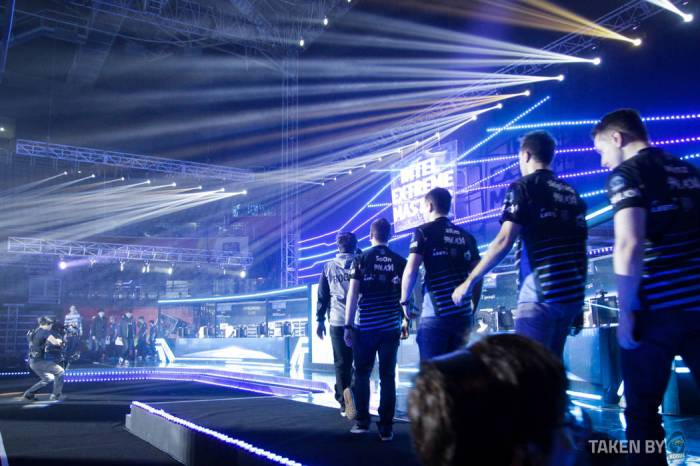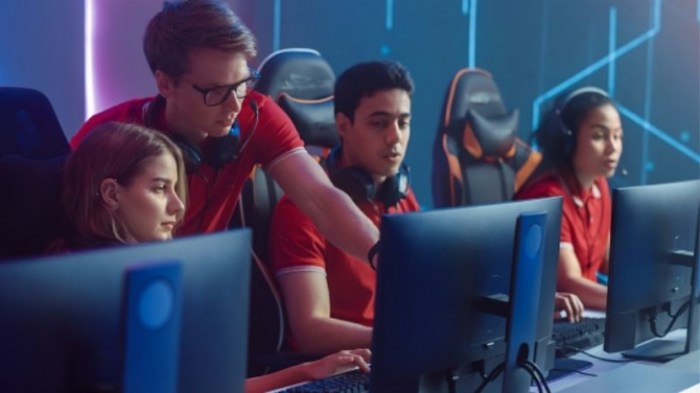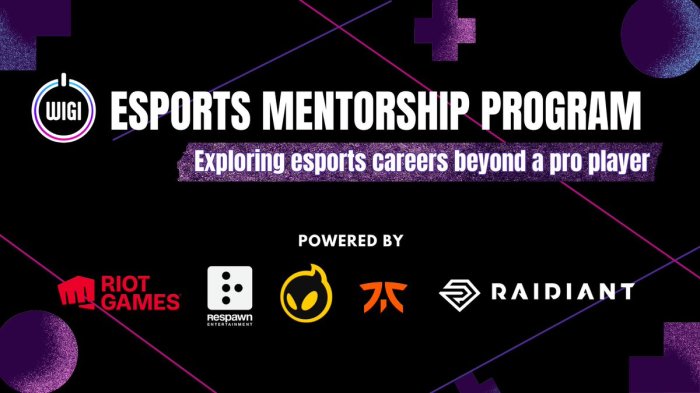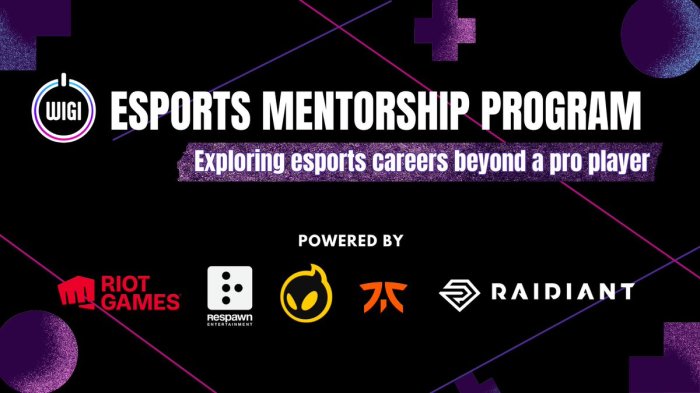Esports Mentorship: It’s not just about the wins; it’s about building a killer team, both on and off the screen. This isn’t your grandpa’s coaching; we’re talking about navigating the unique challenges and opportunities of the competitive gaming world, from mastering in-game strategies to crushing it in the professional scene. Think of it as a strategic partnership, designed to help you reach your peak performance, whether you’re a rising star or a seasoned pro.
This guide dives deep into the world of esports mentorship, exploring the different types of relationships, the benefits for both mentors and mentees, and how to build a truly successful mentorship program. We’ll cover everything from finding the right mentor or mentee to navigating potential challenges and envisioning the future of esports mentorship in a rapidly evolving digital landscape. Get ready to game-ify your growth!
Defining Esports Mentorship

Esports mentorship is a crucial aspect of player development and team success in the competitive gaming world. It involves a more experienced individual guiding a less experienced individual, providing support, knowledge, and strategies to help them improve their skills and achieve their goals within the esports ecosystem. This guidance goes beyond just in-game mechanics, encompassing aspects of mental fortitude, strategic thinking, and even professional development.Effective esports mentorship relies on several core principles.
First, a strong mentor-mentee relationship built on trust and mutual respect is essential. Open communication, active listening, and a willingness to provide constructive feedback are vital. Mentors should tailor their approach to the individual needs of their mentee, understanding their strengths and weaknesses, and setting realistic, achievable goals. Finally, ongoing evaluation and adjustment of the mentorship plan are crucial for maximizing its effectiveness.
Types of Esports Mentorship Relationships
Esports mentorship can take many forms, depending on the individuals involved and their goals. Peer-to-peer mentorship, where players of similar skill levels support each other, is common, fostering collaboration and shared learning. Coach-player mentorship, a more structured approach, sees coaches providing guidance and training to players, often focusing on specific technical skills and strategic development. Team-based mentorship, often involving veteran players mentoring newer team members, focuses on team cohesion and overall team performance.
Finally, organizational mentorship programs may involve established professionals guiding aspiring esports professionals on aspects like branding, media relations, and contract negotiation.
Comparison of Esports and Traditional Sports Mentorship
While both esports and traditional sports utilize mentorship, there are key differences. Traditional sports mentorship often focuses heavily on physical training and conditioning, aspects less prominent in esports. Esports mentorship, however, emphasizes mental resilience and strategic thinking to a greater degree, given the high cognitive demands of competitive gaming. While both involve building strong team dynamics, the virtual nature of esports presents unique challenges and opportunities for mentorship, such as online coaching and remote training.
The rapid evolution of esports also means that mentors need to stay abreast of the latest game updates, strategies, and technologies, a challenge less prevalent in more established traditional sports.
Examples of Successful Esports Mentorship Programs
Several organizations have implemented successful esports mentorship programs. Team Liquid, for example, has a well-established system where veteran players mentor newer recruits, focusing on both in-game strategies and professional development. Cloud9, another prominent esports organization, incorporates mentorship into their player development programs, providing individualized support and guidance to help players reach their full potential. Many collegiate esports programs also feature mentorship components, with upperclassmen guiding and supporting younger players.
These programs often include workshops and seminars focused on topics such as time management, stress management, and career planning, demonstrating a holistic approach to player development.
Benefits of Esports Mentorship for Mentors

Mentoring in esports isn’t just about helping the mentee; it’s a hugely rewarding experience for the mentor as well. It’s a chance to leverage your experience, grow your skills, and expand your network within a dynamic and exciting industry. The benefits extend far beyond simply giving back – they offer significant personal and professional growth opportunities.Mentoring significantly enhances a mentor’s leadership abilities and deepens their industry expertise.
The process of guiding a mentee requires effective communication, strategic planning, and problem-solving – all essential leadership skills. Furthermore, staying current with the ever-evolving esports landscape requires continuous learning, and mentoring provides a unique opportunity to stay sharp by engaging with the latest strategies, technologies, and trends through the lens of a rising star.
Enhanced Leadership Skills and Industry Knowledge
Mentorship provides a practical application for leadership theories. Mentors refine their ability to provide constructive feedback, motivate individuals, and manage conflict. For example, a mentor might help a mentee navigate a challenging team dynamic, honing their conflict resolution skills in a real-world scenario. Similarly, explaining complex industry concepts to a mentee forces the mentor to clarify their own understanding and stay updated on the latest advancements in areas like game strategy, team management, and sponsorship deals.
This continuous learning keeps the mentor relevant and competitive in the esports field.
Expanded Professional Network within the Esports Community
Mentoring creates a powerful network effect. By engaging with mentees and their wider circles, mentors expand their professional connections within the esports community. This could include connections with other coaches, team managers, sponsors, and even players from different teams and organizations. These connections can lead to new opportunities, collaborations, and a deeper understanding of the industry’s ecosystem.
For instance, a mentor might be introduced to a potential investor through their mentee’s network, opening doors to new ventures.
Personal Satisfaction from Guiding and Supporting Aspiring Esports Athletes
The most rewarding aspect of esports mentorship is often the personal satisfaction derived from guiding and supporting aspiring athletes. Seeing a mentee overcome challenges, achieve their goals, and grow both personally and professionally is deeply fulfilling. This sense of accomplishment transcends any professional gain, providing a strong sense of purpose and contributing to a positive impact on the esports community.
The pride in a mentee’s success is a significant personal reward.
Recognition and Opportunities through Mentorship
Mentorship can enhance a mentor’s professional profile and open doors to new opportunities. Demonstrating a commitment to nurturing talent can increase visibility within the esports industry, attracting attention from organizations seeking experienced leaders and professionals. This could lead to invitations to speak at industry events, contribute to publications, or even secure higher-profile roles within esports organizations. A mentor’s reputation for effective mentorship can become a significant asset in their career progression.
Mentorship Program Design and Implementation

Designing and implementing a successful esports mentorship program requires careful planning and execution across several key areas. A well-structured program should focus on clear recruitment strategies, effective mentor-mentee matching, a comprehensive curriculum, and robust evaluation methods to ensure its impact and longevity. Ignoring any of these aspects can significantly hinder the program’s overall success.
Recruitment Strategies
Effective recruitment is crucial for building a strong pool of both mentors and mentees. For mentors, we can target experienced esports professionals, coaches, analysts, and even successful streamers who possess valuable industry knowledge and a passion for sharing their expertise. Reaching these individuals might involve collaborations with esports organizations, universities with gaming programs, and online platforms frequented by esports professionals.
For mentees, recruitment efforts could focus on aspiring esports players, managers, or other individuals interested in pursuing a career in the industry. This could involve partnering with high schools and colleges with active gaming communities, advertising through esports events, and utilizing social media platforms popular among gamers. A strong application process, including clear criteria and a review process, is also essential for selecting suitable candidates.
Mentor-Mentee Matching
Once a pool of mentors and mentees has been established, a thoughtful matching process is critical. This involves considering factors such as the mentee’s goals, the mentor’s experience, personality compatibility, and availability. A structured questionnaire can help gather relevant information from both parties, allowing for more informed pairings. For instance, a mentee aspiring to become a professional League of Legends player would ideally be matched with a mentor who has experience in competitive League of Legends.
The program could also utilize a platform or system to facilitate the matching process, potentially incorporating algorithms to identify the best potential pairings. Regular check-ins and feedback mechanisms would also help ensure the effectiveness of the pairings and allow for adjustments if necessary.
Curriculum Development
The curriculum should be comprehensive and address the diverse needs of the mentees. It should include modules covering technical skills, mental skills, and career development.
Technical Skills Curriculum
This section could cover game-specific skills, strategic thinking, team dynamics, and technical aspects of gameplay, such as optimizing in-game settings and using specific software. For example, a module on “Advanced Tactical Analysis in Dota 2” could cover map awareness, itemization strategies, and hero synergies. Another module might focus on “Optimizing PC Performance for Competitive Gaming,” covering hardware and software settings for optimal gameplay.
Mental Skills Curriculum
This section should address crucial aspects like stress management, resilience, and maintaining a positive mindset under pressure. Techniques such as mindfulness, visualization, and cognitive behavioral therapy (CBT) could be introduced. Examples include modules on “Managing Performance Anxiety in Esports” or “Building Mental Toughness for Competitive Gaming.”
Career Development Curriculum
This section should cover aspects like networking, building a personal brand, creating a professional portfolio, and seeking opportunities within the esports industry. Topics could include “Creating a Professional Esports Resume and Cover Letter,” “Networking Strategies for Esports Professionals,” and “Understanding Esports Contracts and Negotiations.”
Program Evaluation
Measuring the effectiveness of the mentorship program requires a multi-faceted approach. Quantitative data, such as the number of mentees securing internships or jobs in the esports industry, can be tracked. Qualitative data, such as feedback from mentors and mentees through surveys and interviews, provides valuable insights into the program’s impact. Regular program evaluations should also identify areas for improvement and ensure the program remains relevant and effective.
A pre- and post-program survey could assess changes in mentees’ skills, confidence, and career prospects.
Sustaining Long-Term Engagement
Maintaining long-term engagement requires a commitment to creating a supportive and enriching environment. Regular communication between mentors and mentees, opportunities for social interaction, and ongoing professional development resources are crucial. The program could organize workshops, guest speaker sessions, and networking events to foster a sense of community and keep participants engaged. Recognition and celebration of achievements can also help boost morale and motivate continued participation.
For example, a yearly mentorship awards ceremony could acknowledge outstanding achievements and contributions.
The Future of Esports Mentorship

Esports mentorship is a rapidly evolving field, poised for significant growth and transformation in the coming years. The integration of new technologies and the increasing professionalization of esports will reshape how mentorship is delivered and its overall impact on aspiring players and industry professionals. We’ll explore the exciting possibilities ahead and how various stakeholders can contribute to this evolution.Emerging Technologies and Their Impact on Esports Mentorship
Virtual and Augmented Reality’s Role in Mentorship
VR and AR technologies offer unprecedented opportunities to enhance esports mentorship. Imagine a scenario where a mentor can virtually join a mentee’s practice session, providing real-time feedback and guidance within the game environment itself. This immersive experience surpasses traditional screen-sharing, allowing for more nuanced observations and immediate corrections. For example, a Counter-Strike mentor could analyze a mentee’s aim and positioning in real-time, offering specific adjustments within the VR training space.
AR overlays could also provide data visualizations of gameplay metrics, allowing for a more data-driven mentorship approach. This technology could revolutionize coaching and training, leading to faster skill development and a more personalized learning experience.
Artificial Intelligence’s Influence on Personalized Training
AI is poised to revolutionize personalized training within esports mentorship. AI-powered tools can analyze vast amounts of gameplay data to identify strengths and weaknesses, creating customized training plans for each mentee. This data-driven approach allows for more targeted and effective mentorship, optimizing the learning process and maximizing results. For instance, an AI could analyze a League of Legends player’s decision-making patterns and suggest specific scenarios for practice to improve strategic thinking.
AI could also provide personalized feedback and drills, adapting to the individual mentee’s learning style and progress.
Evolution of Esports Mentorship in the Next 5-10 Years
Over the next 5-10 years, we anticipate a significant shift towards more personalized, data-driven, and technologically enhanced esports mentorship programs. The increasing accessibility of VR/AR and AI tools will democratize access to high-quality mentorship, benefiting a wider range of aspiring esports professionals. We foresee a rise in online mentorship platforms that leverage these technologies, providing scalable and efficient mentorship opportunities.
The traditional in-person mentorship model will likely remain relevant, but will increasingly be complemented by virtual and hybrid approaches. Furthermore, the integration of performance analytics and biofeedback will allow mentors to understand the physical and mental aspects of a player’s performance, leading to more holistic development.
The Role of Esports Organizations in Fostering Mentorship
Esports organizations will play a crucial role in fostering mentorship opportunities. By actively investing in mentorship programs and providing resources, organizations can cultivate a strong talent pipeline and enhance the overall professionalism of the industry. This could involve creating formal mentorship programs, connecting experienced players with aspiring ones, and providing training and support for mentors. Organizations could also partner with educational institutions to integrate esports mentorship into curriculum, further expanding its reach.
Leading organizations like Cloud9 and Team Liquid are already demonstrating this commitment by integrating coaching staffs and support systems into their professional teams, serving as models for future development.
Future Landscape of Esports Mentorship: A Visual Representation
Imagine a vibrant, interconnected network. At the center is a hub representing a sophisticated online mentorship platform. From this hub, numerous lines radiate outwards, connecting experienced esports professionals (mentors) with aspiring players (mentees). These lines are multicolored, representing different mentorship styles and technologies used (e.g., in-person sessions, VR training, AI-powered analysis). The platform itself is depicted as a sleek, modern interface with integrated data analytics dashboards, VR/AR capabilities, and AI-driven personalized training modules.
Surrounding the network are various stakeholders: esports organizations, educational institutions, and technology providers, all contributing to the growth and evolution of this dynamic ecosystem. This image portrays a future where mentorship is readily accessible, personalized, and technologically advanced, fostering a more inclusive and professional esports landscape.
Essential FAQs
What if my mentor and I have a personality clash?
Open communication is key! Talk it out, set clear boundaries, and consider if the relationship is truly a good fit. Sometimes, a change of mentor is necessary.
How much time commitment is realistically involved in esports mentorship?
It varies! Some mentors meet weekly, others monthly. Set realistic expectations upfront to avoid burnout for both parties.
Can I find a mentor even if I’m not a pro player?
Absolutely! Mentorship is valuable at all skill levels. Focus on your goals and find someone with experience in areas you want to improve.
What if my mentorship isn’t producing results?
Regular check-ins and honest feedback are crucial. Re-evaluate your goals, communication strategies, and the overall fit of the mentorship. Don’t be afraid to adjust or end the relationship if it’s not working.
